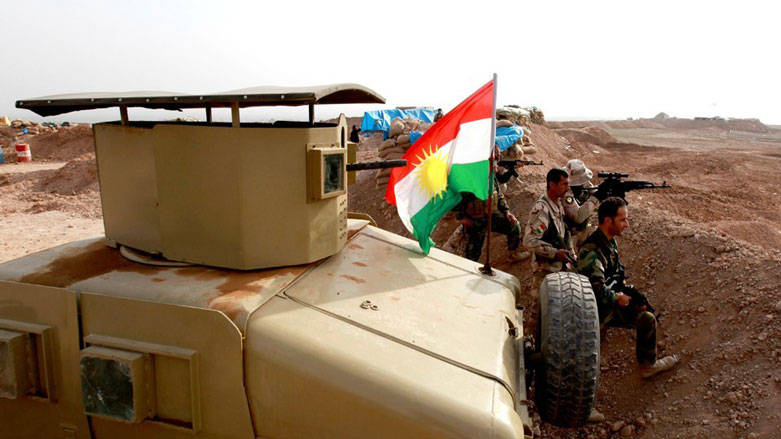KRG attending coalition conference against Islamic State

WASHINGTON DC, United States (Kurdistan24) – On Wednesday, Washington will host a major gathering of the international coalition against the Islamic State (IS). It “will be the first meeting of the entire coalition – all 68 members – since 2014,” when the war against IS began, Mark Toner, the State Department’s Acting Spokesperson, explained.
It will also be the first such meeting that a representative of the Kurdistan Regional Government (KRG) will attend. Dr. Fuad Hussein, Chief of Staff to KRG President Massoud Barzani, will represent Erbil at Wednesday’s conference.
Hussein will also join Prime Minister Haider al-Abadi when the Iraqi delegation meets with US President Donald Trump.
This marks a significant shift since July, a mere seven months ago when Washington last hosted a ministerial meeting of the anti-IS coalition. It reflects the Trump administration’s determination to defeat IS.
Last July, Iraqi Foreign Minister Ibrahim al-Jafaari was allowed to veto KRG participation in the coalition conference, although the Kurdistan Region plays a crucial role in the war against IS.
That role includes actual combat, in which the Peshmerga have sacrificed some 1,400 men fighting the terrorist group. The Kurdistan Region also hosts 1.8 million Internally Displaced Persons (IDPs) and refugees—representing 2/3 of all those in Iraq who have been forced to flee their homes.
Few of the 68 members of the anti-IS coalition have done more than the Kurdistan Region to fight IS, and none with as limited resources as the KRG.
Nonetheless, last summer, the US held that any KRG representation in the anti-IS conference had to be within the Iraqi delegation, and it was up to Baghdad to decide whether to include Kurdish officials or not. That was how Jafaari could veto KRG participation (belatedly, he agreed, but that left no time for a senior official to travel to the US. As a result, the KRG’s Washington representative attended as an observer.)
Those events prompted Kurdish President Barzani to issue a rare rebuke of the US, “Unfortunately, the host of that summit went along with the Iraqi foreign minister.”
Something similar occurred in October—when Paris hosted a conference of the anti-IS coalition, and, again, Jafaari was allowed to block Kurdish representation.
The KRG responded with an official statement condemning Jafaari’s “improper treatment.” The statement noted that relations between Erbil and Baghdad were supposed to have improved, following President Barzani’s visit to Baghdad in September.
“It is surprising that the federal government and the Foreign Ministry insist on preventing the Kurdistan Region delegations from participating in the international conferences and summits related to [IS], IDPs, and refugees” the KRG stated. “We urge the Iraqi side to work seriously to ensure such things do not happen again which does not benefit any side.”
Thus, the presence of Fuad Hussein at the anti-IS conference marks a significant advance, even as it remains the formal US position that KRG participation must continue to be within an Iraqi framework, as the State Department ’s Acting Spokesperson reiterated earlier this month.
One can only speculate, as to why Baghdad’s position changed. The Paris conference took place, just as the Peshmerga and Iraqi Army began working together in the Mosul offensive. Perhaps, that induced a new spirit of cooperation.
Or, maybe, the US quietly took a stronger position. Trump is far more serious than Barack Obama was about defeating IS. In announcing the conference, Toner described US objectives as “the complete defeat of [IS].” Under Obama, the goal was “to degrade and ultimately destroy [IS].” Degrading IS required minimal achievements, while “ultimately” implied no clear time limit.
Toner also affirmed the new Secretary of State “has been crystal clear that defeating [IS] is the State Department’s top priority in the Middle East. He said it in his confirmation hearing, and he said it repeatedly to foreign counterparts.”
Under Obama, the State Department’s top priority in the Middle East was negotiating a settlement to Syria’s civil war, while the Defense Department was responsible for fighting IS.
Strategic incoherence was the result. A political strategy in Syria, without the military muscle to support it, and a war against IS, without a political vision of the desired end-state to guide the military operations.
The Trump administration’s much keener interest in defeating IS redounds to the benefit of the Kurdistan Region. Not only will there finally be Kurdish representation in the Counter-IS conferences, but a senior Kurdish official is among the foreign dignitaries whom the US president is meeting in his first months in office.
Editing by Delovan Barwari
